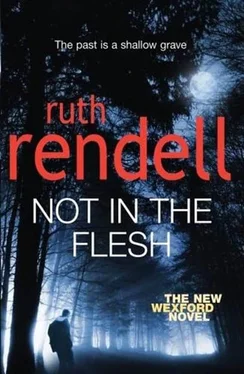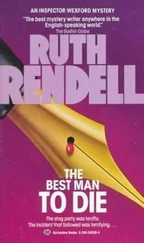She handed Wexford a proof copy of Gone Without Trace across the desk. He would have to make time to read it even if, he thought with an inner sigh, that meant sitting up to do so at night. “There are one or two things I'd like to ask you before that,” he said. “Do you feel up to that now?”
“Of course,” Vivien said. “Of course. We want to help all we can.”
“Then, to begin with, do you, over the lapse of years, have any more idea what it was your father occupied himself with in his study? You mention it quite briefly in the extracts, but you don't come to a conclusion. Perhaps there's more about it in the rest of your book?”
“No, there isn't,” said Selina. “Not really. We tried to find him, that is we tried to find what had happened to him-that's what a large part of the rest of my book is about-we talked to everyone he'd known, all the teachers at his school, the ones who were willing to talk to us, I mean. Not all of them were. We even talked to some of the kids he'd taught. They were-well, contemporaries of ours. So they didn't mind talking to us as much as they might have done to older people. Nobody could tell us much, only that they thought he was studying for a postgraduate degree. This is all in my book.”
“Yes, but in the part I haven't yet read.”
“Right. Sorry. If he was he'd have had to have been in a master's program at a university. We went into all that, but we couldn't find any record of that anywhere. It's possible he was doing it only by correspondence, but we found nothing to support that idea either. He hadn't access to the Internet at home, only at school, and it was what he was doing at home we wanted to know about. One of the students in his A-levels group suggested he might have been conducting-well, some sort of biological experiments, but he hadn't seen the size of the room. And, you know, experiments in biology would involve living things, only plants maybe, but they'd take up space and they'd need water and-well, there was absolutely nothing like that. Dad was crazy about Darwin. He was utterly opposed to these fundamentalists who believe Genesis and God creating the world in six days and all that sh-all that rubbish.”
“Could he have been writing something?” Wexford watched their faces, but they showed nothing but their eagerness to know. “Could he, for instance, have been writing a life of Darwin?”
“If he was,” said Vivien, “he'd have had books about Darwin, lots of books, previous biographies, but he didn't. He just had Origin of Species. ”
“He had an electric typewriter. It was outdated even at the time of his-disappearance. I don't know why he didn't use a computer, but it can't be relevant, can it?”
Wexford was beginning to realize he was learning nothing new and very likely there was nothing new to learn. He sat thinking, said, “Which of you would like to provide us with the DNA?”
“Me, please,” said Selina.
“DC Thayer will drive you to the Princess Diana Hospital to have the swab taken.”
When she had gone, escorted by Adam Thayer, who looked as if he couldn't believe his luck, Vivien said, “I've brought Mum's wedding ring. They had identical rings, you know, both with the same message in them.”
It was in a small polythene resealable pack, a gold ring chased with a leaf pattern and “Forever” engraved inside.
“Your father was wearing his, of course?”
“Oh, yes. I don't think they ever took them off, not even to have showers or wash their hands.”
The remains in the trench had worn no ring. It could have fallen off into the soil, he thought, as the flesh decayed from the bones of the third finger of his left hand, but the earth had been sifted very thoroughly when the body was removed. He remembered watching the masked white-coated men working on it with sieves. Vivien seemed to read his thoughts.
“We'd like to see the-the body. Can we?”
He nearly shuddered. “I don't think so, Miss-er, Vivien. If you wish to I can't stop you, but I don't advise it. What remains”-he had to say this-“isn't much more than a skeleton.”
Her face had whitened. “All right. I see.”
She didn't. Of course she didn't. “I think that if you were to see it, the sight might remain with you always, and there would be no point, there would be nothing to help you identify your father. This DNA test will do that but you must remember it may not be him. Please don't go away from here in the belief that your father has been found.”
Vivien got up. “Shall I wait here for my sister?”
“We can give you somewhere more comfortable to wait. At a later date I may need to borrow the ring. Would that be all right?”
“Of course.”
He would have many more questions if the identification was positive.
That night he began to read Gone Without Trace. Selina had been correct when she summarized its contents, telling him of interviews she and Vivien had conducted with fellow teachers of Alan Hexham's and with students in his A-levels group, their careful search of everything in his study, their speculations as to the post-graduate degree he might have been studying for. Also in her book were some factual details from the transcript of her recorded interview with Denise Cole, and her investigation into the suggestion that her father had been in debt. As he read on, tired now but far from dropping off to sleep, he began to see that their detective work had been exhaustive. Professionals could hardly have done better, yet what it all amounted to was that they had found nothing.
He finished the book at ten minutes to one but had been too stimulated by it to fall asleep for some time. When he did it was to dream, not that a middle-aged man but a little Somali girl had disappeared, while her family and friends denied she had ever existed. In the morning he found that Alan Hexham and his daughters had receded from the forefront of his mind and Irene McNeil stepped or tottered in to take their place. While he slept he had come to a decision. Old and incapacitated as she was, he was going to have to arrest Irene McNeil, question her at the police station, and charge her with what? Concealing a death, certainly. He reflected that Ronald McNeil, trigger-happy Lord of the Manor, had neatly slipped out of any responsibility by dying.
Kingsmarkham police station had once had a single prison cell in its basement. Now there were two. But serious as the offenses were, expecting Mrs. McNeil to occupy it, for even one night, was unthinkable. She must be arrested and charged and allowed to return home. She came meekly enough to the police station with Wexford in his car, driven by Donaldson. When he interviewed her, her solicitor and Burden also being present, she gave much the same answers as she had in her own home. Apparently, she had expected to see the senior partner in the old-established Kingsmarkham law firm who had represented her and her husband for forty years, but he had retired some time before and the solicitor who arrived was a young woman. Mrs. McNeil refused to take any advice Helen Parker gave her and chose to ignore her when she said her client wasn't obliged to answer this or that.
Wexford asked her insistently about the knife she said the intruder had produced to threaten her husband. “But you weren't there, Mrs. McNeil, were you?” he said, only to be told that Ronald never lied. He asked again and again, which caused Helen Parker to say that her client had already told him she was not. This inflamed Mrs. McNeil, not with anger against Wexford, but against “this presumptuous girl” who had no business, she said, to be there at all. When Wexford questioned her as to how she could account for a man carrying a knife while in his underwear, and Helen Parker told her client not to answer, Mrs. McNeil shouted at her to keep out of it. Helen Parker gathered up her jacket and briefcase and walked out.
Читать дальше











